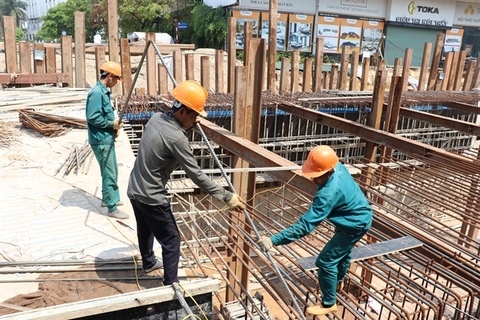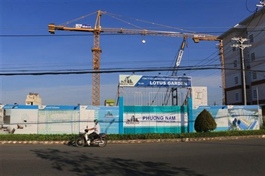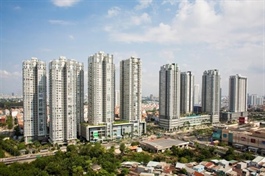Bad debts running rampant in construction sector
Bad debts running rampant in construction sector
Little is known about the exact amount of bad debts being incurred by construction firms, but the non-payment is eating into their bottom line day by day.

Workers handle steel rods at a construction site in Thai Nguyen Province. — VNA/VNS Photo Hoang Nguyen |
Le Hong Minh, Chairman of the 2T Corporation, claimed that he had never witnessed such a serious situation in the construction sector for 40 years. Debt collection has now become a high priority for small- and medium-sized firms.
And his firm is no exception. The debts owed by construction investors to 2T have amounted to over VND200 billion (US$8.5 million), two times higher than its charter capital of VND100 billion.
The firm has no option but to withhold the transfer of some finished units to the investors to press for payment. Dozens of condotel apartments have been put at its disposal as a result of their defaults.
"I've suddenly become the owner of dozens of villas and condotel apartments. But those properties are not eligible for sale as yet because of insufficient legal documents," said Minh.
The chairman remarked that investors' non-payment had pushed many contractors into financial distress and some others into bankruptcy. Several investors went so far as to refuse payment even though they made huge profits from the sale of transferred units.
Very few contractors have taken legal action against their defaulted investors. It took them around three to five years to have their cases heard but the plaintiffs got their money back in just 30 per cent of the cases.
The chairman underlined two factors behind investors' tendency to default on their payments: their upper hand in negotiations and legal loopholes.
Investors have more bargaining power than contractors in negotiations because there are few investors but plenty of contractors in the market. Their higher position has put the latter at a disadvantage when it comes to payment clauses.
Regarding legal loopholes, contractors are required to have various types of bank-issued guarantees, including performance security, to be qualified for a contract. Meanwhile, the requirement applicable to investors is far more lenient.
On top of that, certain bank-backed guarantees presented by investors can only be activated with proof of their acceptance of construction work. That means if the investors deliberately refuse to accept contractors' work, the latter would be unable to, by any means, request the banks to pay in the event of investors' default.
Minh called for new regulations that require investors to present bank-backed guarantees unconditionally covering all the feedstock and equipment employed by contractors.
Nguyen Quoc Hiep, Chairman of the Viet Nam Association of Construction Contractors, said the debt defaults were vertically spilling over into other construction players. The long chain of defaulters has thrown the sector into disarray.
"Investors owed contractors, contractors owed sub-contractors, sub-contractors owed suppliers, and so on," said Hiep.
He cited legal loopholes as the main cause of the situation. He called for new regulations to fix the loopholes and hedge contractors against non-payment. He also believed that "arbitration and litigation should only be used as a last resort".
Dogged by non-payment, many contractors have begun to shun all-inclusive contracts with investors to reduce default risks. They engage in nothing more than procuring workers for the investors or acting as sub-contractors to foreign companies. — VNS























